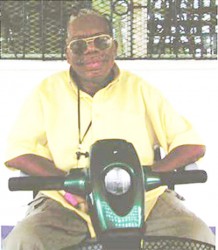By Leon Walcott
During the last ten years several events occurred that positively changed the landscape for persons living with disabilities in Guyana. The country became a signatory to the United Nations Convention on the Rights of Persons with Disabilities in 2007 and ratified the Convention in 2013. In 2010 the Persons With Disabilities Act was assented to by the National Assembly. Earlier, in 2008, the Guyana Council of Organizations for Persons with Disabilities was established under the Chairmanship of Leon Walcott. Walcott had said then that the focus of the new body was ”to advocate for the fulfillment of the rights of Persons With Disabilities (PWD) through advocacy, awareness raising, education, and skills training. Our ultimate objective is to assist persons living with disabilities in Guyana to move from a state of self-pity to one of self-respect.” He explained too that establishing the organization was part of a strategy implemented by the Voluntary Services Overseas (VSO) and the National Commission on Disability (NCD) to lay the foundation for improving the quality of life for individuals living with disabilities.
Persons with disabilities still endure many social disadvantages, including labelling, exclusion and rejection. They are more likely to be poor and undereducated and to have fewer opportunities than other members of the population.
This has resulted in a great increase in the workload of the GCOPD which has a membership of 22 disability organizations. Walcott is currently pursuing an annual subvention for the GCOPD.

Over the years the social attitude towards the disabled has undergone a paradigm shift. In earlier years disability was viewed as a tragic pitiful circumstance requiring charitable intervention. In those days a medical model of disability was being used. This model has been replaced by what is considered to be a more workable social model.
This shift has coincided with the changing international view of disability from a largesse-based perspective to a rights-based perspective. The international community has now recognized that the disabled deserve a respectable status in society on the same terms as the non-disabled. With the emergence and popularity of the human rights movement, attention of various policy framers has been boldly and categorically shifted from “the mere provision of charitable services to vigorously protecting their basic right to dignity and self-respect.”
In the new scenario persons living with disabilities are viewed as individuals with wide ranging abilities having the potential of being equal partners in the social, economic, political and cultural development of Guyana. Persons living with disabilities in Guyana number about 50,000. Disabled persons constitute 10 percent of the world’s population. Over time, they have been deprived of equal access to opportunity and resources.
Other factors including ignorance, superstition, and fear have further contributed to their alienation.. One disability volunteer is of the view that “the general attitude of society towards persons with disabilities has not changed much.”
There is, however, evidence of a degree of change. Education is the main tool in that process. Education has been a tool for persons with disabilities though there is need for a greater focus on developing the skills of disabled children.
Guyana has four state-run schools devoted to special needs education – David Rose School for Handicapped Children, Diamond Special Needs, New Amsterdam Special Needs, Open Doors Vocational Training Centre and the Ministry of Education Resource Unit for the Blind. Special Education has been placed on the curriculum of the Cyril Potter College of Education. Last year the Ministry financed the successful preparation of the first batch of Guyana Society for the Blind candidates to sit the Caribbean Secondary Education Certificate (CSEC). The top top performer obtained five Grade One passes and the overall pass rate was 82.4%.
Historically, disability matters were the responsibility of the Ministry of Health. Then, the
medical model was used to deal with the condition. However, many persons with disabilities feel that the responsibility should be handed over to the Ministry of Human Services and Social Security, a circumstance that would require an increased number of trained Social Workers.
Persons with disabilities have been the recipients of training programmes aimed at awareness raising, capacity building and advocacy.
Employment
Expansion of employment opportunity is essential to promoting the economic interests of persons with disabilities. Employment opportunities, particularly at the higher levels, are sharply limited. The lack of employment opportunities for disabled persons results is, in some measure, a function of discrimination.
In 2013 the disabled community received a G$20 million state that had been promised by the government in 2011. The grant is intended to finance projects that will be both sustainable and income – generating. Up to this time four disability organizations have received a total of $7 million to implement income-generating projects. Those organizations are the Deaf Association of Guyana, the Ruimveldt Parent Support Group, the Wismar Baptist Church Deaf Ministry and the Guyana Blind Cricket Association. The specific activities which have received funding include are Computer Training, pig and poultry rearing shadehouse farming and block- making.
June Julien of the Wismar Baptist Church Deaf Ministry, observed that the “newly acquired skills gained under the watchful eyes of competent personnel in Linden have begun to generate income, with tremendous support from the Linden community.” Ms. Julien added that “feelings of fulfillment, excitement, anticipation and joy are conveyed through their eyes, body language facial expression and hands.” These are the feelings expressed by the deaf participants in their income generating venture with seed money from the Disability Fund, Government of Guyana. Pride in seeing their produce neatly arranged, waiting to be sold. Prospective buyers tap on the concrete blocks and inevitably give thumbs up at the quality. It is good to see a truck drive up and anticipate how many blocks will be sold. A full yard of blocks means business is slow, an emptying yard means production needs to be increased – the income is steady bringing a sense of useful activity that pays dividends




